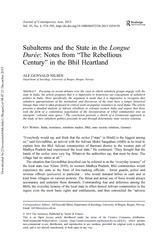Subalterns and the State in the Longue Durée: Notes from “The Rebellious Century” in the Bhil Heartland
Peer reviewed, Journal article
Published version

Åpne
Permanent lenke
https://hdl.handle.net/1956/10964Utgivelsesdato
2015-04-17Metadata
Vis full innførselSamlinger
- Department of Sociology [429]
Originalversjon
https://doi.org/10.1080/00472336.2015.1034159Sammendrag
Focusing on recent debates over the ways in which subaltern groups engage with the state in India, the article proposes that it is imperative to historicise our conceptions of subaltern politics in India. More specifically, the argument is made that it is imperative to recognise that subaltern appropriations of the institutions and discourses of the state have a longer historical lineage than what is often proposed in critical work on popular resistance in rural India. The article presents a detailed analysis of Adivasi rebellions in colonial western India and argues that these took the form of a contentious negotiation of the incorporation of tribal communities into an emergent “colonial state space.” The conclusion presents a sketch of a Gramscian approach to the study of how subaltern politics proceeds in and through determinate state–society relations.
